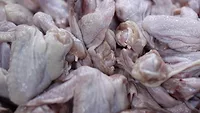FSIS Reports Temporal Changes in Foodborne Salmonella Outbreaks by Food Type

Credit: Detmold via Pixabay
The U.S. Department of Agriculture’s Food Safety and Inspection Service (USDA’s FSIS) recently published an article in the journal Epidemiology & Infection that examines temporal changes in the proportion of Salmonella outbreaks related to 12 food categories. The study analyzed instances of salmonellosis originating from 12 food categories from 1998–2017: beef, chicken, dairy, eggs, fish and seafood, miscellaneous meats, pork, seeded vegetables, sprouts, turkey, and other vegetables.
FSIS gathered and analyzed data from the U.S. Centers for Disease Control and Prevention’s (CDC’s) National Outbreak Reporting System. The dataset includes 2,712 foodborne Salmonella outbreaks, of which 863 were attributed to a single food vehicle. The total cases of salmonellosis was 72,412 and the total number of illnesses linked to an identified food vehicle was 34,082.
The article states that the number of foodborne Salmonella outbreaks with an identified food vehicle increased significantly between 1998 and 2000, followed by a decade of decreasing instances of foodborne Salmonella outbreaks. The number of outbreaks rose again between 2010 and 2014.
In its analysis, FSIS discovered that nearly 60 percent of all foodborne Salmonella outbreaks are caused by chicken, eggs, pork, and seeded vegetables. Eggs showed the greatest reduction in the proportion of associated Salmonella outbreaks over time, while seeded vegetables and pork reflected an increasing trend of associated Salmonella outbreaks. Significant temporal changes were not observed for any other food category.
FSIS states that the results of its study, in addition to public comments on the proposed performance standards for Salmonella on pork products, will be used to inform FSIS policy development targeted to reduce Salmonella illnesses attributable to pork.
Looking for quick answers on food safety topics?
Try Ask FSM, our new smart AI search tool.
Ask FSM →







